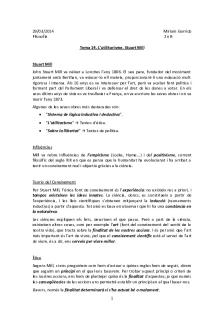Mill Questions 3 PDF

| Title | Mill Questions 3 |
|---|---|
| Author | Campbell Hill |
| Course | Ethics |
| Institution | Marquette University |
| Pages | 1 |
| File Size | 56.2 KB |
| File Type | |
| Total Downloads | 54 |
| Total Views | 133 |
Summary
Daily assignment to read and answer specific questions....
Description
Read Mill’s selection, pp. 22-27 1) Is happiness attainable by (almost) all? Explain a. Mill says that happiness is technically attainable by all. He says, “All the grand sources, in short, of human suffering are in a great degree, many of them almost entirely, conquerable by human care and effort” (22). Mill is saying that although many generations have struggled with the world’s evils, in principle, it is possible for everyone to attain happiness. It is indeed possible to live without happiness, as many people have already done. Yet it is equally possible to attain happiness. 2) Does self-sacrifice have any value? Explain a. Self-sacrifice is the highest virtue which can be found in man (23). Sacrificing happiness gives the best prospect of realizing that such happiness is attainable. Mill is basically saying that when someone sacrifices their own happiness, it actually makes happiness an even better possibility. This man will be satisfied with small things in life and less afraid of the evils in life. When this man does find happiness: “the sources of satisfaction accessible to him, without concerning himself about the uncertainty of their duration, any more than their inevitable end” (24). Selfsacrifice has value, but it must increase the sum of total happiness.
3) Does the motive determine the morality of the action? Ought people to attend to something other than their private utility? Explain. a. The motive has nothing to do with the morality of the action, though much with the worth of the agent (26). Mill is saying that regardless of intentions, if the outcomes of your actions are good, then your action is moral. People should attempt to attend to things other than their private utility, yet it is not always feasible. Mill uses the golden rule of the Bible – to love your neighbor as you would love yourself – to get this point across. Humans highest priority of happiness should be of other people. There should be a connection in one’s mind between the happiness of yourself and the happiness of the public. In other words, you should be happy when you think others are happy. But as long as you are not actively harming others in achieving private happiness, you are following moral expectations. People don’t have to actively be thinking of other’s happiness because when you make yourself and your family happy, that is enough. If everyone is achieving their own happiness (and their loved one’s happiness) without hurting other’s, then everyone in the world is technically happy....
Similar Free PDFs

Mill Questions 3
- 1 Pages

hammer mill
- 39 Pages

Resumen Mill
- 3 Pages

Resumen Stuart Mill
- 4 Pages

Positivismo (comte + mill)
- 5 Pages

Mill - Nota: 10
- 8 Pages

James Mill - Apuntes 2
- 3 Pages

John Stuart Mill
- 2 Pages

Stuart Mill (apuntes)
- 2 Pages

Resumen Sobre la libertad, Mill
- 9 Pages

Fallo MILL DE Pereyra resumen
- 1 Pages

Stuart mill biografia e teses
- 4 Pages

6. Stuart Mill - L,utilitarisme
- 16 Pages
Popular Institutions
- Tinajero National High School - Annex
- Politeknik Caltex Riau
- Yokohama City University
- SGT University
- University of Al-Qadisiyah
- Divine Word College of Vigan
- Techniek College Rotterdam
- Universidade de Santiago
- Universiti Teknologi MARA Cawangan Johor Kampus Pasir Gudang
- Poltekkes Kemenkes Yogyakarta
- Baguio City National High School
- Colegio san marcos
- preparatoria uno
- Centro de Bachillerato Tecnológico Industrial y de Servicios No. 107
- Dalian Maritime University
- Quang Trung Secondary School
- Colegio Tecnológico en Informática
- Corporación Regional de Educación Superior
- Grupo CEDVA
- Dar Al Uloom University
- Centro de Estudios Preuniversitarios de la Universidad Nacional de Ingeniería
- 上智大学
- Aakash International School, Nuna Majara
- San Felipe Neri Catholic School
- Kang Chiao International School - New Taipei City
- Misamis Occidental National High School
- Institución Educativa Escuela Normal Juan Ladrilleros
- Kolehiyo ng Pantukan
- Batanes State College
- Instituto Continental
- Sekolah Menengah Kejuruan Kesehatan Kaltara (Tarakan)
- Colegio de La Inmaculada Concepcion - Cebu


